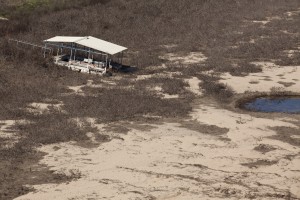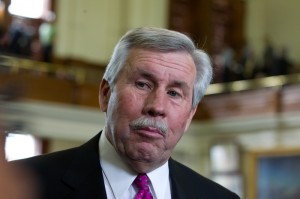Citing ‘Mismanagement,’ Lawmaker Threatens Massive Overhaul of LCRA

Photo by Jeff Heimsath for StateImpact Texas
Receding waters have ravaged communities in the Highland Lakes.
It’s almost strange to refer to the Highland Lakes of Central Texas as “lakes.” They’re sitting at just over a third full, and Lake Travis looks more like a river with plenty of bare, scraggly shoreline. The lake system is the crucial water supply for the million-plus people in and around Austin, and they could reach their lowest levels ever this summer.
While the drought is one of the reasons the Highland Lakes are in dire straits, they would be about double their size today if massive amounts of water hadn’t been sent downstream to rice farmers in 2011. It was enough water from the lakes to supply the City of Austin’s share for three years. And the decision to release that water – by the Lower Colorado River Authority (LCRA) – is coming under renewed criticism from Republican state Senator Troy Fraser (R-Horsehoe Bay), chairman of the powerful Senate Natural Resources Committee. He’s threatening to try and have the LCRA’s permit revoked.
Fraser says that decision three years ago to release water to rice farmers is just one of several mistakes made by the LCRA during the drought, but it might be the costliest. “Because they mismanaged the lakes, they’ve now caused [for] themselves a financial crisis,” Fraser says.
Rice farmers on the Lower Colorado pay far less for their water than cities and other municipal customers do, because by contract their supply is “interruptible.” Fraser says if the LCRA hadn’t released so much water in 2011 (a move he cautioned against at the time), more water would have stayed in the lakes. That water could then have been sold at the much higher rate to “firm” customers like cities and water systems, to the tune of roughly 65 million dollars.

Texas Tribune
State Senator Troy Fraser (R-Horseshoe Bay) says the LCRA is a "rogue river authority."
“Because they basically gave it away downstream, now they don’t have water to sell, they don’t have revenues coming in,” Fraser says. “And instead of doing what I would do as a responsible businessman — I would cut expenses to make sure I’m not spending more than I’m taking in, they’re doing just the opposite.” The LCRA is now proposing rate increases for many of its customers, and could make a decision this summer.
Some cost-cutting to help offset a lack of water revenues could come from the salaries of LCRA’s management, Fraser argues. The new head of the LCRA, General Manager Phil Wilson, is making $425,000 a year, with up to a 25 percent bonus. (The individual that replaced Wilson as head of the LCRA, Becky Motal, took home $395,000 a year and a severance package close to $600,000.) And five new executives hired by the LCRA to work under Wilson will each make between $215,000-$300,000.
“That’s a little suspicious to me, that we start paying people a lot of money, and then all of the sudden there’s a rate increase on the public at the same time,” Fraser says. For its part, the LCRA says that less than 1 percent of LCRA’s costs for water go to “non-water executive salaries” and that in the aggregate, executives under the new management team are actually earning less.
The LCRA naturally disagrees with Fraser’s other criticisms. They say the 2011 decision to release water from the lakes to rice farmers was done because that’s what their existing water plan and contracts prescribed. “Had LCRA refused to release water, it would have violated its contractual responsibility to these customers,” the authority says in a statement. “At no time was the supply of water for firm customers in danger.”
As for the water rate increases, the LCRA notes they will apply to both “firm” and “interruptible” customers, and are necessary to cover costs.
“We already pay the highest water rates of any major basin in the state,” Fraser counters.
While the proposed LCRA water rate increases won’t apply to the city of Austin, which has negotiated its rates separately with the LCRA for the long-term, cities like Cedar Park, Leander and Plfugerville will. The current proposed water rate hike is over 15 percent, going up another three percent every year after that.
“They’re [the LCRA] going to put the expense of their bad business decisions, their bloated bureaucracy, and they’re going to try and balance their books on the backs of the people of Central Texas,” Fraser says.
The water divvying between city and farmer interests that has worked for decades no longer makes sense, Fraser says, and people in his district, by paying higher rates for their water, are essentially being taxed to subsidize farmers growing a water-intensive crop hundreds of miles away. “There’s other places for them [rice farmers] to get their water,” he says, like using groundwater instead. “They would just rather get our cheap water.”
For three consecutive years, most rice farmers downstream have not received water from the Highland Lakes. While they have paid interruptible rates for decades, it wasn’t until 2012 that their supply was actually interrupted.
Crop insurance has helped farmers get by; some are sticking with rice and using more expensive groundwater supplies, while others are switching to different, less-thirsty crops. A new reservoir being built downstream especially for agriculture is expected to cost at least $200 million, and rates for rice farmers are likely going to go up to better reflect their true cost.
The LCRA is caught between the various water interests, trying to balance the water supply of a million people around a city with the business needs of a few dozen farmers that were here first. Both sides are cutting back: Austin’s per capita water use has declined significantly, while agricultural users have used far less water from the Lower Colorado because of the curtailment. However, even after the cutoffs of the last few years, agricultural customers in the basin still make up nearly a quarter of all the water use.
The LCRA is a unique entity, in that it doesn’t answer to the legislature directly, and has a great deal of autonomy. It’s a quasi-state agency with deep pocketbooks, one that Fraser has unsuccessfully tried to get the state to audit several times. “I’ve got a rogue river authority that, basically, I can’t control!” Fraser says.
“I’ve made it very clear to them that they need to start managing the [Highland] Lakes in a responsible way,” Fraser says. “If they don’t do that, then we go to step two, which is forcing them to do that.”
That force could come in the form of a court case or possibly even an effort to revoke the LCRA’s water permit, an unprecedented step that could remove the LCRA’s authority to manage the region’s water supply.
“Their permit says they have to take care of all current and future needs,” Fraser says. “You can’t release water to an interruptible source that would ever cause the future restriction [of a firm customer], and that’s what happened here. They have really thumbed their nose at this.”
Whether or not Fraser attempts to make those moves depends in part on what happens next with the LCRA’s troubled water management plan. The state authority reviewing it, the Texas Commission on Environmental Quality (TCEQ), has delayed its approval, citing inadequate modeling and forecasts by the LCRA. It’s possible that a revised plan would establish a firm floor for how much water needs to stay in the lakes, and it could be recommended early this summer.
But if Fraser doesn’t get his way, keep an eye out on the next legislative session. He hasn’t shied away from reworking agencies in the past, like a bill last session that completely overhauled the leadership of the Texas Water Development Board.
“We created the LCRA,” Fraser says. “We could uncreate it.”


